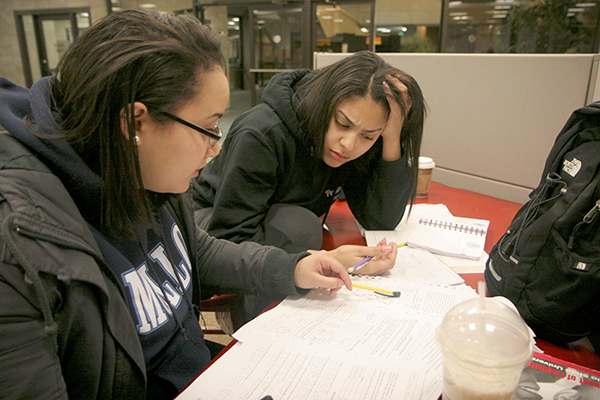
It’s an endlessly exhausting and vicious cycle: You stay up all night writing that paper that you’ve been putting off for days or weeks, only to drift off into a half-slumber during your lecture the next morning, and then nap like a 2-year-old after classes are finished for the day. Then, you lie awake at 4:21 a.m. wondering why your eyes won’t just shut already.
You have that 8:30 a.m. class tomorrow (actually today and in just a few short hours) that you will be completely dysfunctional for, if you even manage to make it there at all. You’ll try to nap off the damage and replenish your energy, but that will probably only result in yet another sleepless night.
As a college student, it is generally accepted — if not socially and academically required — that you will be nocturnal. In the realm of higher education, all-nighters are just as commonplace as the exams and papers that cause them. You may think that watching the sunrise from Glenn G. Bartle Library is going to help us out in the long run. But you’re probably wrong.
The National Sleep Foundation has found that 63 percent of college students, on average, do not get enough sleep. This causes 15 percent of students to fall asleep in class semi-regularly and lose 30 percent of the knowledge they have gained during the class time when paying attention. So that extra 3 a.m. study session to get a high score on that exam may actually be negatively impacting your GPA.
Christina Rodriguez, a sophomore majoring in linguistics, said that during her freshman year at Binghamton University, most of her homework was done later than it should have been.
“I didn’t get my work done at normal hours,” Rodriguez said. “Last year, I was up until four in the morning like every day.”
Now Rodriguez tries to get her work done in between classes.
“Compared to last year, I wouldn’t say I’m sleep-deprived,” Rodriguez said. “I think you could also categorize that in with adjusting as a freshman. Sophomore year, you know that you can’t fall asleep in your classes anymore.”
But sleep deprivation is not exclusive to freshmen. Michelle Mendez, a sophomore majoring in psychology, also deals with it.
“I do the most work when I’m trying to fall asleep, very late at night,” Mendez said. “I started an essay last night at midnight. I finished it at around 1:30 or 2.”
While her study habits may cause her to be tired for her classes the next day, she said that it works for her.
“I can’t do anything early. I procrastinate too much, but I feel like I write my best stuff when I’m under pressure,” Mendez said.
But she also said she encounters a problem with her late-night work when it comes to exams, as opposed to papers or homework.
“It affects my work with studying,” Mendez said. “I can’t cram everything in time.”
So what can you do to combat problems with exhaustion?
First, don’t take the daily nap. Catching a few more hours of sleep between classes may be tempting, but it won’t help. Sleeping during the day will only cause you to sleep less at night. Try to avoid caffeine products, especially late at night. That latte or Red Bull might help you make it through the next chapter, but it’s not going to permit for sleep.
Also, don’t study in bed — use it for sleeping only. Save the books for your desk, the study lounge and the library. And most of all, stop procrastinating.
Doing as much of your work as possible during the day is the best way to safeguard that you won’t be stuck doing it well into the night. But don’t use your newfound free time for other things. If you have an early class the next morning, be smart and get some sleep.


